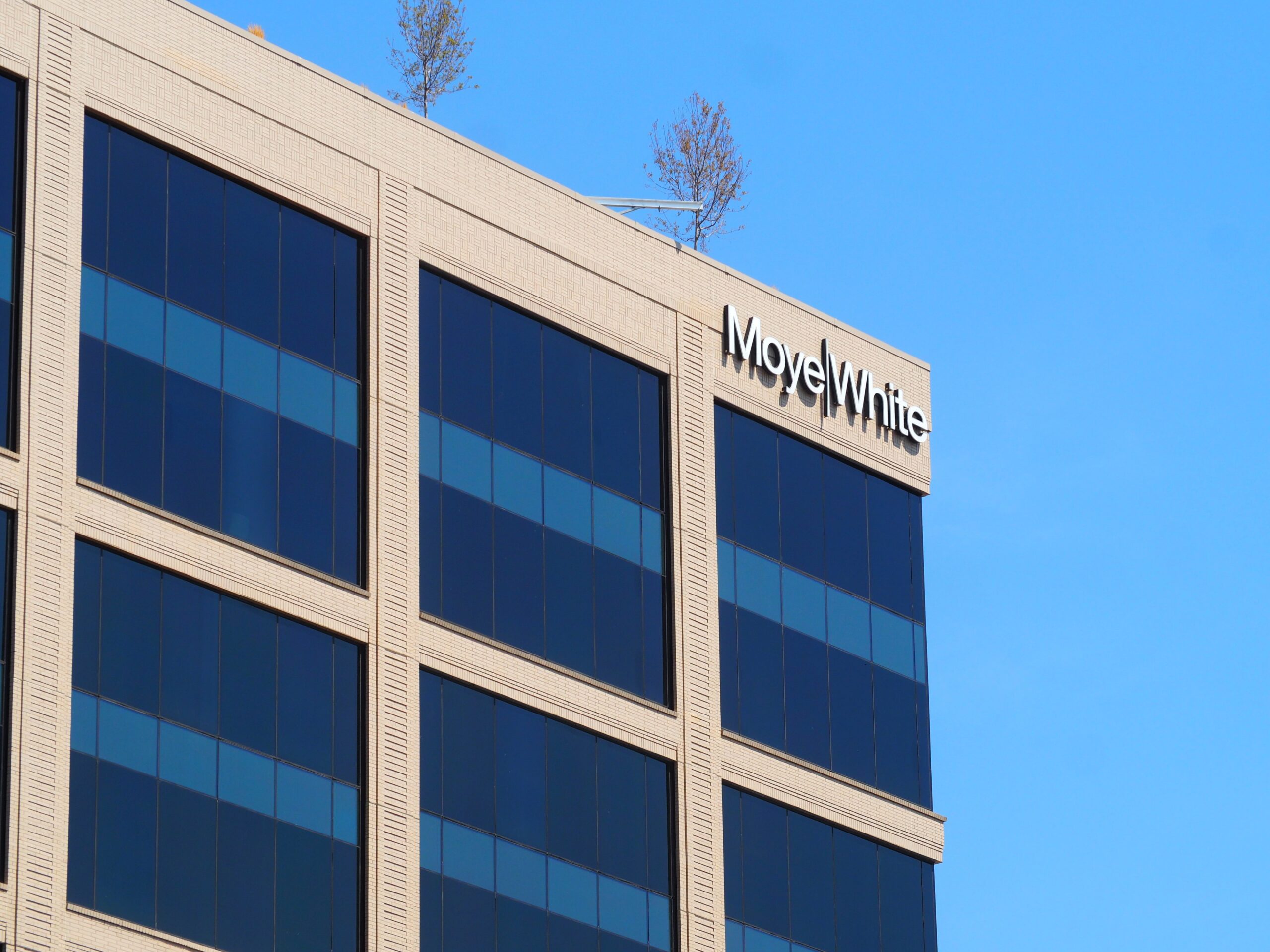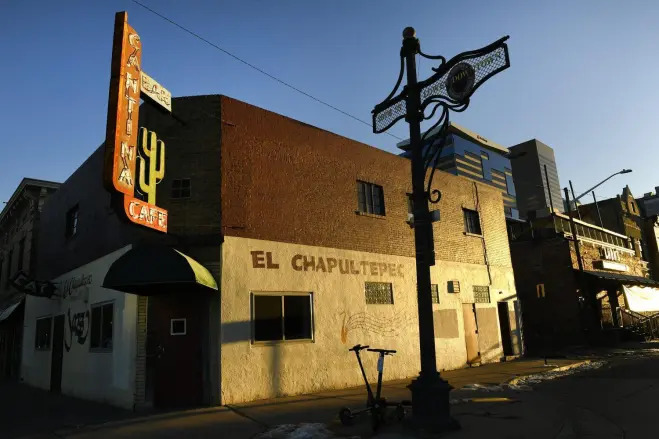
Zeppelin Station is an office building in RiNo with a food hall on the first floor. (Courtesy Zeppelin Development)
A lot happens in a year.
Yesterday we shared a handful of themes that emerged from BusinessDen’s reporting this year.
Below are some additional notable moments as we look back on the last 12 months.
Local office owner fights lender
There’s no question office is the most challenged sector in real estate.
Across the county, building owners are defaulting on their loans. Demand for office space has dropped. Refinancing is challenging. And there are few buyers if owners want to sell.
When owners default, lenders often ask a judge to appoint a third-party caretaker, known as a receiver, to oversee the property. The requests are typically perfunctory, because most loan agreements specify that the borrower agrees to a receiver if default occurs.
This spring, however, one local landlord fought back.
When Wells Fargo asked a judge to appoint a receiver for Zeppelin Station at 3501 Wazee St., Denver-based Zeppelin Development fought back in court — arguing both that a receiver was unneeded and that, if a receiver was going to be appointed, the judge should not pick Wells Fargo’s requested firm.
Zeppelin Station’s loan was in default for failing to maintain the necessary ratios regarding property income to debt spelled out in the loan agreement. But Zeppelin and its CEO Kyle Zeppelin emphasized that the firm had been making the required monthly payments, and the loan had not matured.
After arguing back-and-forth in filings, lawyers for Zeppelin and Wells Fargo met in a downtown courtroom in May. The judge largely decided in Wells Fargo’s favor, although Zeppelin did get a minor victory when some wording in the receivership order was refined.

Moye White signage atop a RiNo office building. (BusinessDen file)
Two big names in the local legal scene exit
The days of talking about Moye White and Sherman & Howard are over.
Moye White, Denver’s 13th-largest firm, ceased operating in April when — in an unusual move — the vast majority of its attorneys and supporting staff agreed to join the Denver office of Phoenix-based Fennemore. A handful of other attorneys went to Frost Brown Todd and Lewis Roca.
Moye White itself was not acquired as part of the arrangements, which raised the question of what would happen with the firm’s new RiNo office space. That question was answered in August, when Fennemore said it would lease the bulk of it.
In September, meanwhile, Sherman & Howard, Denver’s oldest and third-largest law firm, announced that it will be swallowed up by Cincinnati-based Taft on New Year’s Day — a more common arrangement than Moye White’s mass exodus. The combined operations will not use the Sherman & Howard moniker.
Brian Watson goes on the offensive
Denver developer Brian Watson, owner of Northstar Commercial Partners, has been in the news since spring 2020, when Amazon sued him in connection with his efforts to build data centers in Virginia for the company.
Watson got good news in 2023, when a judge dismissed most of Amazon’s civil claims against him and a related criminal investigation began being walked back. (It has since ended; Watson was never charged criminally.)
In 2024, Watson went on the offensive. Between August and the end of the year, he filed four lawsuits.
In August, Watson sued a fellow homeowner at Grand County’s C Lazy U Ranch, accusing the woman of defamation for allegedly calling Watson a “criminal” and saying he slept with prostitutes.
In September, Watson sued a former Northstar employee who emailed Amazon’s Jeff Bezos in 2019 with concerns about the payments made in connection with the development deals.
And in October, in a lawsuit filed against his former financing partner IPI Partners, Watson for the first time publicly outlined what he believed prompted the legal battle that has consumed his last four years.
And two days before Christmas, Watson filed suit against Amazon itself and various company executives.
Those cases remain pending.
Amazon’s original lawsuit against Watson is still pending too. The company appealed the dismissal of its claims against Watson. The Fourth Circuit Court of Appeals heard arguments in late October but has yet to rule.

The sun sets on the outside of El Chapultepec on Dec. 7, 2020 in Denver. (Helen H. Richardson, The Denver Post)
Three key debates over preservation
Denver typically has a couple situations each year that pit preservation and redevelopment.
In 2024, there were three.
In January, Denver’s Landmark Preservation Commission unanimously voted to deny an owner-opposed landmark designation application for a single-family home in Denver’s Park Hill neighborhood.
In March, developer Kenneth Monfort of Monfort Cos. announced he planned to demolish the former El Chapultepec building near Coors Field. That prompted the nonprofit Historic Denver to push for preservation. In June, the two parties announced they’d reached a compromise, which will see a portion of the structure’s facade preserved.
Also in June, Denver developer Pando Holdings asked the landmark commission to let it demolish two dilapidated structures in the 1600 block of East Colfax Avenue, both part of the Wyman Historic District. The commission said no. But six months later, in December, the commission OKed demolition after a hearing that focused on the financial realities of renovating the structure.
Xplosion
In 2023, signs of strain emerged at a Chicago-based development firm called The X Company, which was building hip, amenity-rich apartment buildings around the country.
The firm halted construction in multiple cities and, in December, told residents at one of its two Denver complexes that their building’s private “club” was closing.
Things got dicier in 2024.
In January, BusinessDen reported that $20 million in liens had been filed against the company’s X Denver 2 complex in Arapahoe Square.
In April, the site where a third X Denver building had been planned was sold at a huge loss.
And in December, BusinessDen reported on frustrations of residents in the original X Denver complex in Union Station North, who described shuttered amenities, unaddressed maintenance issues and duller nightlife.
“There were rooftop pool parties, I mean, almost every weekend,” one resident said. “Friday, Saturday, Sunday you would hear that music bumping, and you really don’t anymore.”

Zeppelin Station is an office building in RiNo with a food hall on the first floor. (Courtesy Zeppelin Development)
A lot happens in a year.
Yesterday we shared a handful of themes that emerged from BusinessDen’s reporting this year.
Below are some additional notable moments as we look back on the last 12 months.
Local office owner fights lender
There’s no question office is the most challenged sector in real estate.
Across the county, building owners are defaulting on their loans. Demand for office space has dropped. Refinancing is challenging. And there are few buyers if owners want to sell.
When owners default, lenders often ask a judge to appoint a third-party caretaker, known as a receiver, to oversee the property. The requests are typically perfunctory, because most loan agreements specify that the borrower agrees to a receiver if default occurs.
This spring, however, one local landlord fought back.
When Wells Fargo asked a judge to appoint a receiver for Zeppelin Station at 3501 Wazee St., Denver-based Zeppelin Development fought back in court — arguing both that a receiver was unneeded and that, if a receiver was going to be appointed, the judge should not pick Wells Fargo’s requested firm.
Zeppelin Station’s loan was in default for failing to maintain the necessary ratios regarding property income to debt spelled out in the loan agreement. But Zeppelin and its CEO Kyle Zeppelin emphasized that the firm had been making the required monthly payments, and the loan had not matured.
After arguing back-and-forth in filings, lawyers for Zeppelin and Wells Fargo met in a downtown courtroom in May. The judge largely decided in Wells Fargo’s favor, although Zeppelin did get a minor victory when some wording in the receivership order was refined.

Moye White signage atop a RiNo office building. (BusinessDen file)
Two big names in the local legal scene exit
The days of talking about Moye White and Sherman & Howard are over.
Moye White, Denver’s 13th-largest firm, ceased operating in April when — in an unusual move — the vast majority of its attorneys and supporting staff agreed to join the Denver office of Phoenix-based Fennemore. A handful of other attorneys went to Frost Brown Todd and Lewis Roca.
Moye White itself was not acquired as part of the arrangements, which raised the question of what would happen with the firm’s new RiNo office space. That question was answered in August, when Fennemore said it would lease the bulk of it.
In September, meanwhile, Sherman & Howard, Denver’s oldest and third-largest law firm, announced that it will be swallowed up by Cincinnati-based Taft on New Year’s Day — a more common arrangement than Moye White’s mass exodus. The combined operations will not use the Sherman & Howard moniker.
Brian Watson goes on the offensive
Denver developer Brian Watson, owner of Northstar Commercial Partners, has been in the news since spring 2020, when Amazon sued him in connection with his efforts to build data centers in Virginia for the company.
Watson got good news in 2023, when a judge dismissed most of Amazon’s civil claims against him and a related criminal investigation began being walked back. (It has since ended; Watson was never charged criminally.)
In 2024, Watson went on the offensive. Between August and the end of the year, he filed four lawsuits.
In August, Watson sued a fellow homeowner at Grand County’s C Lazy U Ranch, accusing the woman of defamation for allegedly calling Watson a “criminal” and saying he slept with prostitutes.
In September, Watson sued a former Northstar employee who emailed Amazon’s Jeff Bezos in 2019 with concerns about the payments made in connection with the development deals.
And in October, in a lawsuit filed against his former financing partner IPI Partners, Watson for the first time publicly outlined what he believed prompted the legal battle that has consumed his last four years.
And two days before Christmas, Watson filed suit against Amazon itself and various company executives.
Those cases remain pending.
Amazon’s original lawsuit against Watson is still pending too. The company appealed the dismissal of its claims against Watson. The Fourth Circuit Court of Appeals heard arguments in late October but has yet to rule.

The sun sets on the outside of El Chapultepec on Dec. 7, 2020 in Denver. (Helen H. Richardson, The Denver Post)
Three key debates over preservation
Denver typically has a couple situations each year that pit preservation and redevelopment.
In 2024, there were three.
In January, Denver’s Landmark Preservation Commission unanimously voted to deny an owner-opposed landmark designation application for a single-family home in Denver’s Park Hill neighborhood.
In March, developer Kenneth Monfort of Monfort Cos. announced he planned to demolish the former El Chapultepec building near Coors Field. That prompted the nonprofit Historic Denver to push for preservation. In June, the two parties announced they’d reached a compromise, which will see a portion of the structure’s facade preserved.
Also in June, Denver developer Pando Holdings asked the landmark commission to let it demolish two dilapidated structures in the 1600 block of East Colfax Avenue, both part of the Wyman Historic District. The commission said no. But six months later, in December, the commission OKed demolition after a hearing that focused on the financial realities of renovating the structure.
Xplosion
In 2023, signs of strain emerged at a Chicago-based development firm called The X Company, which was building hip, amenity-rich apartment buildings around the country.
The firm halted construction in multiple cities and, in December, told residents at one of its two Denver complexes that their building’s private “club” was closing.
Things got dicier in 2024.
In January, BusinessDen reported that $20 million in liens had been filed against the company’s X Denver 2 complex in Arapahoe Square.
In April, the site where a third X Denver building had been planned was sold at a huge loss.
And in December, BusinessDen reported on frustrations of residents in the original X Denver complex in Union Station North, who described shuttered amenities, unaddressed maintenance issues and duller nightlife.
“There were rooftop pool parties, I mean, almost every weekend,” one resident said. “Friday, Saturday, Sunday you would hear that music bumping, and you really don’t anymore.”


